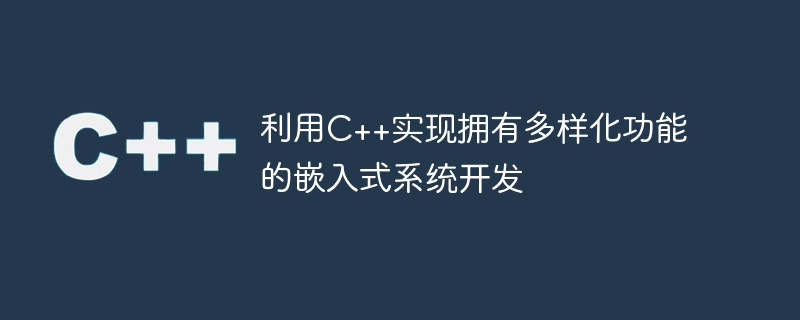

Use C to realize the development of embedded systems with diverse functions
In recent years, with the continuous development of computer technology, the application of embedded systems has become more and more widespread. . Embedded systems refer to computer systems with specific functions embedded in different devices, including many fields, such as home appliances, automobiles, medical equipment, etc. C is a powerful programming language that offers high performance and flexibility, which is why C plays an important role in the development of embedded systems. This article will introduce how to use C to realize the development of embedded systems with diverse functions and provide some code examples.
In embedded system development, C can help us achieve a variety of functions, such as real-time data processing, device driver development, etc. The following will introduce the applications of C for two common embedded system functions.
First, we can define a class named DataProcessor, which contains methods and member variables for processing data. The following is an example:
class DataProcessor {
public:
void processData(int data) {
// 在这里添加处理数据的代码
// 例如:计算平均值,检测异常值等
}
private:
int running_sum = 0; // 累加和
int count = 0; // 数据个数
};In this example, we define a DataProcessor class, which contains a method processData that processes data. We can implement the processing logic of real-time data in this method. For example, we can calculate the average of the data, detect whether there are outliers, etc.
In order to develop a device driver, we can create a class named DeviceDriver and define the operation method of the device in this class. The following is an example:
class DeviceDriver {
public:
bool initialize() {
// 初始化设备的代码
// 返回是否成功初始化设备
}
void controlMotor(int speed) {
// 控制电机转动的代码
// 根据速度参数控制电机的转速
}
int readTemperature() {
// 读取温度传感器的代码
// 返回当前温度值
}
};In this example, we define a DeviceDriver class, which contains the device initialization method initialize, the method controlMotor to control the rotation of the motor, and the method readTemperature to read the temperature sensor. By implementing these methods, we can easily control the operation of the device.
Through the above two examples, we can see the potential of using C to realize the development of embedded systems with diverse functions. The powerful features of C make embedded system development easier and more efficient.
To sum up, this article introduces how to use C to realize the development of embedded systems with diverse functions. Through C's high performance and flexibility, we can achieve real-time data processing, device driver development and other functions. I hope this article will be helpful to embedded system developers and provide some inspiration.
The above is the detailed content of Use C++ to develop embedded systems with diverse functions. For more information, please follow other related articles on the PHP Chinese website!
 Is linux an embedded system?
Is linux an embedded system?
 What are the differences between c++ and c language
What are the differences between c++ and c language
 Recommended learning order for c++ and python
Recommended learning order for c++ and python
 Cost-effectiveness analysis of learning python and c++
Cost-effectiveness analysis of learning python and c++
 Is c language the same as c++?
Is c language the same as c++?
 Which is better to learn first, c language or c++?
Which is better to learn first, c language or c++?
 The difference and connection between c language and c++
The difference and connection between c language and c++
 C++ software Chinese change tutorial
C++ software Chinese change tutorial




